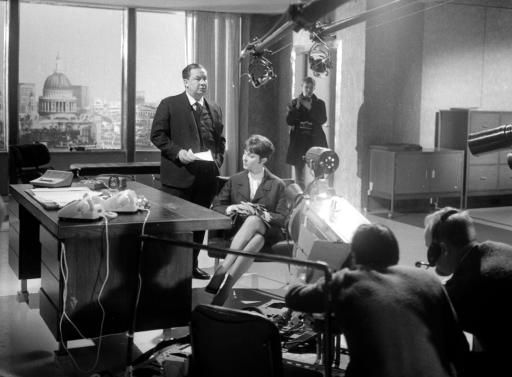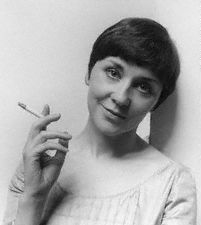Arguably the most influential post-War writer doesn’t need much by way of introduction. By the mid 60s Harold Pinter was past the disaster that was the opening of The Birthday Party (1958) and the phenomenal success that was The Caretaker (1960). Five of his plays had been broadcast on ITV and lasting fame was secured.
Broadcast as part of The Largest Theatre in the World strand, a pan-European project co-funded by the European Broadcast Union, Tea Party was Pinter’s first commission for the BBC and broadcast on 25 March 1965, the same day that the Selma to Montgomery march led by Martin Luther King reached its climax. Two years later, The Basement, originally conceived as part of a film trilogy, was shown as part of Theatre 625 (on the same day that Kurt Cobain was born, who I suppose you could connect with Pinter via a couple of plays with Danny Dyer), named after the new higher definition broadcasting format being trialled on BBC 2 at that time. Both plays were directed by Charles Jarrott, now probably best remembered as the director of Mary Queen of Scots (1971) which was nominated for six Oscars and Condorman (1981) which…wasn’t.

Pinter would later adapt Tea Party and The Basement for the stage, and they premiered as a double bill at the Eastside Playhouse, New York in October 1968. Both productions carry Pinter’s hallmarks of naturalised speech, a highly detailed setting, a shallow normality hiding something far darker and his common theme of male insecurity and paranoia.
I find television the most natural setting for Pinter. The camera can direct focus and detail with a subtlety not always possible on stage. And while current technology can blur the divide between how television and film are consumed, at the time these plays were produced, a film was something you left the house to watch, usually with other people. Television was something you invited into your home, where the minutiae and details of your own intimate world were close at hand as you watched Pinter skewer those of others.

Tea Party is a lavish production with large sets and a depth of field much greater than most 60s BBC productions. The opening shots sit in contrast with what is to come. A woman, Wendy (Vivien Merchant) arrives in a corridor of a modern, almost futuristic office building. The camera follows and sometimes goes on ahead, looking back as she makes her way to the door at the end. There are regular tracking shots of Wendy’s POV, sweeping past displays of sanitary equipment. An empire built on human waste. Jarrott’s visual info dumping brings to mind some of Orson Welles’ rapid camera work in Citizen Kane (1941). Wendy is here for a job interview as the boss’s secretary. A man with a feet of clay. Feet that are covered in shit.
The boss, Disson (Leo McKern) seemingly has everything, self-made with a beautiful home and two healthy boys. He’s a widower but now about to marry for the second time. His wife, Diana (Jennifer Wright) is from a higher social class but accepts and loves him totally. But Disson’s uneasy and paranoid and he doesn’t know why. We first meet Disson at Wendy’s interview, sitting behind his desk exuding power and confidence. Wendy explains that in her last job she was sexually harassed and was forced to leave. Disson expresses outrage, as if such base matters had never occurred to him as even possible. During this exchange the camera jarringly cuts to close-ups of Wendy’s legs and feet – subtext with the least possible emphasis on sub.
Wendy isn’t the focus of this play but she’s the heart of it. Once she’s got the job she exudes confidence and sexuality, and plays games with Disson that border on the kinky. She has far less to lose than Disson and she knows it. Actress Vivien Merchant had been married to Pinter since 1956 and at the time of broadcast he was in the middle of a long running affair with Joan Bakewell, which would later inspire his play Betrayal (1971). It’s hard not to see Merchant as a prism through which Pinter viewed women. Consider also her role as Ruth in Pinter’s The Homecoming (1965), where as the only women in the play (and in the lives of the play’s characters) she embodies the mother/wife/whore paradigm that so many critics identify in Pinter’s women.

Disson’s paranoia is personified by occasional and inexplicable sight loss. In May this year a study, published by the European Association for Predictive, Preventive, and Personalized Medicine and led by Prof. Bernhard Sabel, from the Institute of Medical Psychology at Magdeburg University in Germany, explain that persistent stress, which raises levels of the hormone cortisol, can negatively affect our vascular and sympathetic nervous systems. This, in turn, affects our brain and eyes, which may lead to conditions such as glaucoma and optic neuropathy — ultimately resulting in complete vision loss. (Medical News Today, Thursday 21 June 2018). But if it’s perfectly possible to go blind through stress, what might be causing it in Disson?
The class prejudice that pretty much underpins British cultural life is certainly in play here. Like many self-made men now given access to a higher level of society than their upbringing would otherwise permit, Disson feels unworthy and in constant need of reassurance from Diana. He fears cuckolding from his suave brother-in-law, Willy (!) (Charles Gray) despite the fact that they’re brother and sister, and he lavishes favours and gifts on him in a manner that leaves the viewer in no doubt that Willy has little in the way of respect for him. Disson is simply too eager to please to make respect necessary. And yet as Joseph Heller once noted “Just because you’re paranoid doesn’t mean they aren’t after you.” Anyone with experience of anxiety will know the power that lies in the possibility your worst fears are true even if they probably aren’t. Even his best friend, the optometrist Disley (John Le Mesurier) can’t be best man at his wedding because he’s ill, and Disson struggles to find another friend to replace him. The power of this play lies with how many men watching empathise with Disson a little more than they might have realised.
While The Basement is lower key, its focus is slightly wider. Law (Derek Godfrey) lives alone in his middle class basement flat. Late one evening an old friend, Stott (Pinter himself), rings the doorbell. Law invites him in and asks him to stay. But Stott is not alone, he’s brought Jane (Kika Markham). Within ten minutes the couple are in bed and Law is left awkwardly on his own armchair.
Drawing on themes of the invasion of intimate space and of sexual jealously, The Basement works because it eschews character development in favour of increasingly absurd situations to make its point. You don’t know why Stott and Jane have come here, nor anything about any of their lives. Law has a recurring fantasy dream with Jane that playfully riffs on From Here to Eternity (1953) (with more sand castles). The men compete in sports which are as much about mind games as athletic prowess. Twitter uses of a certain outlook may use the world “cuck” to describe much of what’s going on here.

The furniture transforms from slight old-fashioned suburbia (which Scott disapproves of) to ultra-modern 60s style as control of the space wrests from Law to Scott. However when the furniture changes again to highly impractical baroque, including a gilded throne, you know Pinter’s aim is somewhat wider. Towards the end the basement flat is all but bare, Law and Stott improvising a game of cricket.
Through it all Jane is the still point, the eye of the storm around which Law and Stott rage. There is no character there, she’s a template onto which any man in or out of the fiction of this piece can project their insecurities and paranoia. How much is she the instigator of all this?

The last scene hits the reset button and the basement is as we saw it at the start, only now it is Scott reading at home and Law (with Jane) ringing the doorbell. The men are interchangeable and doomed to repeat the same patterns whichever point they start from.
The writing of The Basement ensures that any shortcomings of the production are largely overlooked, although the constant switching between videotape and film in the first five minutes is pretty hard to ignore.
Pinter’s insecure men provided fertile ground on which writers like David Nobbs and Ricky Gervais could create Reginald Perrin and David Brent. And it doesn’t take much effort to go from Pinter to watching Steptoe and Son (1962-74) or Ever Decreasing Circles (1984-89) to see how his detailed realism masking the absurd became a template for comedy.



One thought on “The Value of Myth #5: The Largest Theatre in the World: Tea Party (1965), Theatre 625: The Basement (1967)”